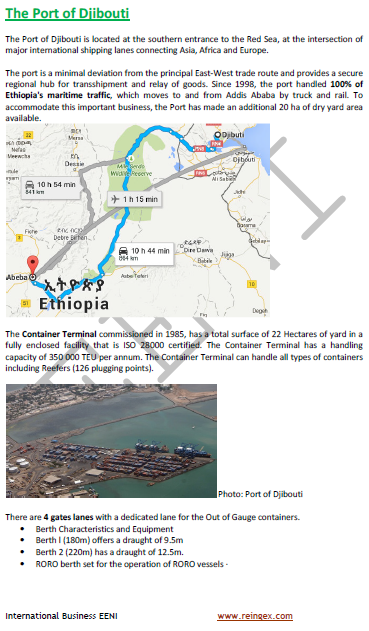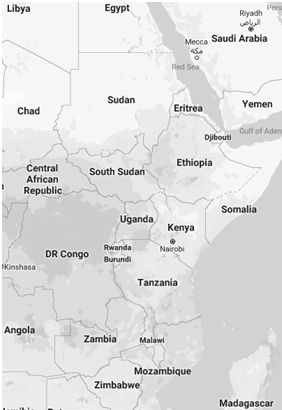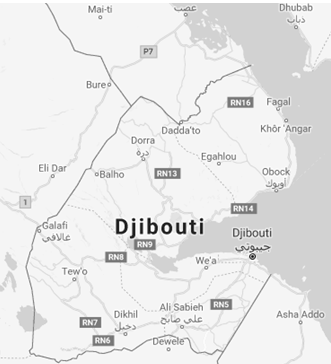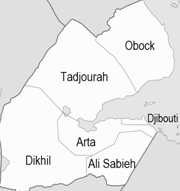Foreign Trade and Transport in Djibouti, Port
Port of Djibouti (Business), Ali Sabieh, Tadjoura, Dikhil

Djibouti is an East African country
- Djibouti City («district of Djibouti») is the economic, logistics, political and administrative capital of Djibouti and the largest Djiboutian city
- The largest cities of Djibouti are Djibouti City, Ali Sabieh, Tadjoura, Dikhil and Obock
- Services are the mainstay of the Djiboutian economy (80% of the GDP)
- Tourism in Djibouti is one of the growing economic sectors
- Currency of Djibouti: Djiboutian Franc (DJF)
- The Intergovernmental Authority on Development (IGAD) is headquartered in Djibouti City.
- Djibouti share borders with Eritrea (125 kilometres), Ethiopia (342 kilometres) and Somalia (61 kilometres)
- Djibouti maintains very close relationships with Somalia and Ethiopia
- Territorial claims of the Ras Doumeira peninsula (Eritrea)
- Djibouti is located in the Horn of Africa (Red Sea and Gulf of Aden)
Transport and Logistics in Djibouti

- Port of Djibouti (access to Ethiopia)
- N'Djamena-Djibouti Trans-African Highway
 Djibouti
Djibouti


More information: International Trade and Business in Djibouti, at EENI Global Business School.
- Djiboutian population: 0.9 million people
- Population density of Djibouti: of Djibouti 21 inhabitants / km²
- Calling code of Djibouti: 253
- Country code top-level domain of Djibouti: .dj
- Djibouti is a Republic
- جمهورية جيبوتي in Arabic
- Jabuuti in Somali

- Area of Djibouti: 23,200 km²
- Djibouti has eight mountain ranges with peaks over 1000 meters.
- Mousa Ali chain is considered to be the highest mountain range in Djibouti (border with Ethiopia and Eritrea)
- The desert of Grand Bara covers parts of southern Djibouti (regions of Arta, Ali Sabieh and Dikhil)
- Djibouti gained its Independence from France in 1975 (History of Djibouti)

The six administrative regions (Djibouti City is one of the official regions) and the districts of Djibouti are:

Djiboutian regions (area in km², population in thousands of people, capital):
- Ali Sabieh Region (2,200, 71, Ali Sabieh)
- Arta Region (1,800, 40, Arta)
- Dikhil Region (7,200, 83, Dikhil)
- Djibouti City (200, 530, Djibouti City)
- Obock Region (4,700, 36, Obock)
- Tadjourah Region (7,100, 85, Tadjoura)

Trade and Business Organisations (Djibouti)
- Intergovernmental Authority on Development (IGAD)
- Common Market for Eastern and Southern Africa (COMESA)
- U.S.-COMESA Agreement
- COMESA-EAC-SADC Agreement
- Community of Sahel-Saharan States (CEN-SAD)
- Preferential Trade System of the Organisation of Islamic Cooperation (OIC)
- OHADA
- Islamic Development Bank
- Organisation of Islamic Cooperation
- Arab League
- International Organization of La Francophonie (OIF)
- African Union
- AUDA-NEPAD
- Economic Commission for Africa
- African Development Bank
Main Djiboutian ethnicities:
The two largest Djiboutian ethnic groups are Somalis (Issa clan, 60% of the population of Djibouti) and Afar (35%).
The official languages of Djibouti are French, Arabic and Somali (Afro-Asian language).
- 524,000 Djiboutian speak Somali as their mother tongue
- 306,000 Djiboutian speak Afar as their mother tongue
The main religion in Djibouti is Sunni Islam.
Higher Education in Djibouti
Minister of Higher Education and Research of Djibouti
- University of Djibouti
- Study Centre and Research of Djibouti


 Tweet
Tweet

